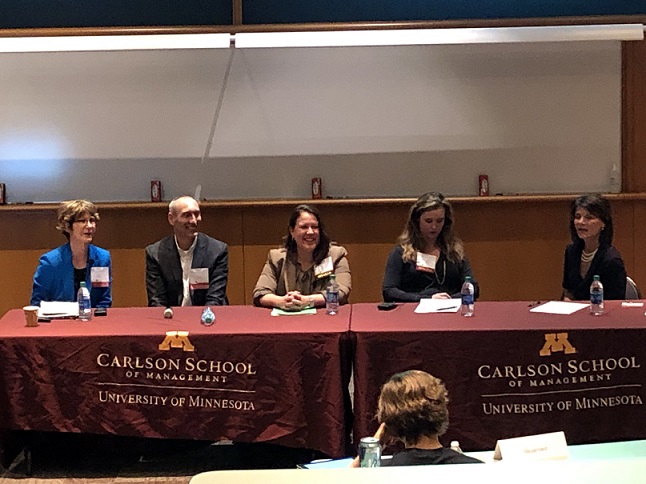Stories
Offering the payer perspective on the opioid epidemic
Patrick Gleason, PharmD, shares how PBMs are helping to solve the opioid epidemic
October 31, 2019 Payers – pharmacy benefit managers (PBMs) included – are implementing programs and innovations to help decrease inappropriate, and harmful, opioid prescribing even further. Recently, Patrick Gleason , PharmD, assistant vice president, health outcomes at Prime Therapeutics, participated on a panel at the University of Minnesota Carlson School of Management Medical Industry Leadership Institute (MILI) Policy Forum “Combating Minnesota’s Opioid Epidemic”. This event was a one-day policy forum bringing together public and private stakeholders in the state of Minnesota and at the federal level to discuss how to collaboratively build upon current federal, state and local efforts to combat the opioid epidemic. The goal was to identify policy gaps, overlaps, successes and opportunities.
Payers – pharmacy benefit managers (PBMs) included – are implementing programs and innovations to help decrease inappropriate, and harmful, opioid prescribing even further. Recently, Patrick Gleason , PharmD, assistant vice president, health outcomes at Prime Therapeutics, participated on a panel at the University of Minnesota Carlson School of Management Medical Industry Leadership Institute (MILI) Policy Forum “Combating Minnesota’s Opioid Epidemic”. This event was a one-day policy forum bringing together public and private stakeholders in the state of Minnesota and at the federal level to discuss how to collaboratively build upon current federal, state and local efforts to combat the opioid epidemic. The goal was to identify policy gaps, overlaps, successes and opportunities.
Gleason discussed the need for wide-ranging solutions because “If you just focus on opioids, you have missed a fair amount of concern on utilization of substances that could lead to mortality and negative outcomes.” For example, Prime:
- Aligns to the Centers for Disease Control and Prevention’s (CDC) guidelines for first fill limits to curb both excessive duration and dosage of controlled substances.
- Implements step therapy requiring prescribed opioids to have an immediate release formulation prior to receipt of extended release medicines.
- Uses predictive modeling techniques to better identify Medicare individuals who are at increased probability of receiving high dose opioids.
- Utilizes an industry-leading fraud, waste and abuse program to identify bad-acting prescribers, pharmacy and members that contribute to harmful controlled substance use.
- Provides an Opioid Safety Guide at the pharmacy counter, which was associated with four-fold increase in overdose reversal drug dispensing in a pilot project.
- Works with a health plan client to install pharmacy point-of-sale alerts that reduce opioid overprescribing.
Combating Minnesota’s Opioid Epidemic Panel

Panelists (left to right): Amy Burt, DO, medical director, UCare; Pat Gleason; Virginia Kakacek, MD, medical director, HealthPartners; Anne Marie Polak, JD, senior director, Leavitt Partners; Archelle Georgiou, MD, industry advisor, executive in residence, MILI, Carlson School of Management.
Together, the panel – and the full day’s content – offered many ideas and solutions on how to best protect the safety and health of Minnesotans. “This event was highly informative with diverse perspectives, and it’s a dialogue we need to stay engaged in to continue seeing good news with the opioid epidemic,” said Gleason. “At Prime, we continue to work both upstream and downstream to be as effective as we can to get members the right medicine at the right time, and that absolutely includes controlled substances when appropriate.”
Related news
Stories
July 22, 2024
Introducing the latest issue of our medical and pharmacy benefit management report
The summer 2024 issue of the Magellan Rx Report provides insights on the industry’s most groundbreaking managed care solutions in some of the most complex areas of health care
Stories
July 18, 2024
Specialty drug trend forecasted to drop for employer groups, clinical experts say
Introduction of Humira® and Stelara® biosimilars contribute to continued decline in the autoimmune – anti-inflammatory trend
Stories
July 16, 2024
Prime/Magellan Rx earns top score on the Disability Equality Index
For the second consecutive year, Prime Therapeutics/Magellan Rx Management received a score of 100 on the Disability Equality Index®, which benchmarks disability workplace inclusion